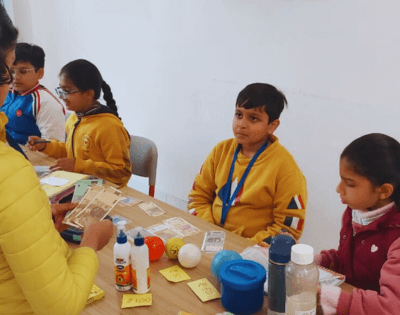
There is always that one student in your child’s class who always has their name up on the list of toppers, yet are barely found submerged in their studies or with books. How do they do it? Is there a magic trick to gaining high scores in tests without pulling all-nighters?
Children who seem to have it all in place do use a trick, and it doesn’t even require casting a spell!
They have learnt the art of using their time effectively and follow a smart study approach that involves conceptual understanding and memory retention.
In this blog, we unlock some easy-to-follow smart study tips. Let’s take a look at them.
1. Space out study times
This approach is simple; instead of getting your child to sit in one place for three hours to complete their homework and study, divide it into four sessions of equal duration. You can have a calendar or schedule in place that also accounts for breaks after each session.
e.g.
3.00 – 3.45 p.m.: Maths practice session
4.15 – 5.00 p.m.: Homework session
7.00 – 7.45 p.m.: Grammar and vocabulary session
9.30 – 10.15 p.m.: Science concepts session
Alternatively, you can have an open or more flexible schedule, where your child lists their tasks for the day and plans them out in four different sessions as per their requirement.
Spacing out also works when it comes to assignments that are due in a few weeks. Your child can spend 15-20 minutes every day to do some part of it, instead of doing it all in one go at the nth hour.
This way, your child will avoid getting anxious about deadlines and remain in touch with their subjects through the year.
2. Mix it up!
Say your child has a mathematics test coming up. The general practice is to complete one chapter of the syllabus before moving on to the next. This might not be such a great practice, considering that your child is likely to forget the first chapter by the time the test day arrives.
Instead, let them do some puzzles and activities from different chapters in one session, depending upon their interest. For example, calculating areas of squares and triangles followed by finding out multiples and factors of numbers.
As they switch from one chapter to another, their minds form trends and try to fit the different concepts together. This accounts for a more holistic learning experience.
If they encounter a problem that involves more than one concept, the likelihood of them being puzzled by it is low.
3. Make diagrams and figures
Often, in science, there are concepts that involve detailed diagrams. Since children find it easier to remember more visual things, let them draw those diagrams themselves and hang them on their boards.
If there is a lesson about food chains, ask them to make their own food chain, one that differs from the book. They can make various food cycles with or without pictures of animals. When these diagrams are always in their sight, they are likely to remember them for a longer time.
You can perform this exercise with numbers as well. For example, writing down all special constants such as pi, e, i, etc., with their values against them.
Diagrams and pictures followed by notes are the best way to memorise lessons.
4. Add some noise
Silence is not always golden. When studying in a quiet environment, a child’s mind is likely to wander off.
At times, some sort of background sound can stimulate better concentration.
Nice instrumental music in a learning environment improves memory retention and focus. A 45-minute session may be more productive than that of two hours when there is a suitable musical accompaniment.
5. Utilise lighter weeks
Oftentimes, there is little homework and no upcoming test at the start of a new school session. Utilising this free time can substantially help lessen the burden on your child in busier days.
Push your child to spend a few hours studying lessons or practising problems that haven’t yet been taught in their class.
This is also a great time to work on upcoming projects and assignments to stay ahead of the class. You can help your child in understanding concepts that are yet to be covered in school, which they might need for their projects.
Lighter days bring in less stress. So, it is also a good idea to take this time to revise material and prepare for the next day.
Conclusion
Apart from incorporating the tips mentioned above, it is also important to encourage your child to play outdoors. Exercise plays a vital role in helping your child remember what they learnt. According to research, consistent exercise increases blood flow to the brain and boosts memory and learning by 30%.
Similarly, a child must get adequate sleep to perform well in academics. A minimum of eight to nine hours of sleep daily is necessary for a school-going child. According to a widely acclaimed book by celebrated science journalists Po Bronson and Ashley Merryman, “A loss of one hour of sleep is equivalent to [the loss of] two years of cognitive maturation and development.”
Remember that consistency is the key to studying smart. Studying day in and day out when exams are around the corner can lead to stress and reduce memory retention. So, prevent your child from slacking off during the initial days and help them utilise that time to study a little every day.




